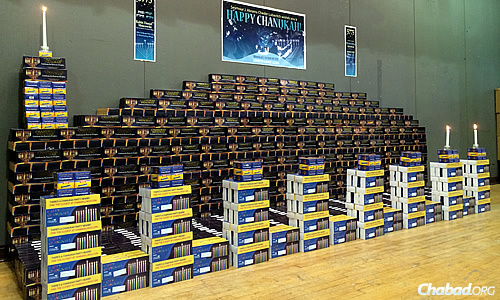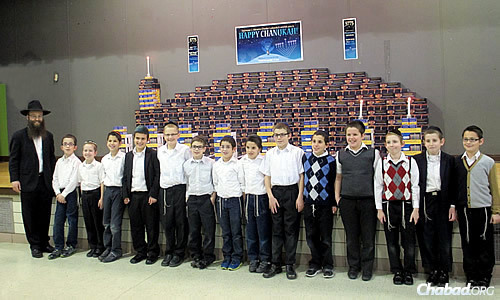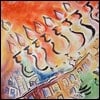Giant can menorahs, coin menorahs, toy menorahs, tile menorahs and even greeting-card menorahs have been produced by Rabbi Avraham Varnai’s fourth-graders at a school outside of Chicago.
But this was the first time that they made a jumbo “menorah” menorah out of 1,770 other menorahs.
“We produced our first popsicle-stick menorah back in 2004,” explained Varnai, who teaches Judaic studies to fourth-grade boys and girls, respectively, at Seymour J. Abrams Cheder Lubavitch Hebrew Day School in Skokie, Ill. “Since 2007, when we made one of the first can menorahs, our project has been focused on helping others.”
In 2008, they made a menorah out of clear tubes filled with pennies donated to Chai Lifeline, a nonprofit organization that helps kids with cancer. In 2009, the children collected thousands of toys, which they then distributed to hospitals and other organizations after Chanukah. In 2010, they made a menorah out of Light” Shabbat-candle kits, then took it apart and gave the kits to women and girls in the area, asking them to light Shabbat candles in merit of any two people in the community who were ill at the time.
In 2011, they constructed their menorah out of greeting cards for terror victims in Israel (every card was also accompanied by a dollar that went to the Chabad Terror Victims Project to use toward gifts for affected children). In 2012, the menorah incorporated a giant mosaic of thousands of individually decorated tiles, each one representing another good deed pledged.
In 2013, they again constructed a can menorah but one much bigger than the original, using a total of 4,000 cans.

In Memory of a Beloved Rabbi
This year, Varnai and his students wanted to do something special in memory of Rabbi Daniel Moscowitz, regional director of Lubavitch Chabad of Illinois, who passed away in March at the age of 59. “His life was dedicated to illuminating Illinois with the light of Torah and Chassidism,” said Varnai, “so we felt it was most appropriate to make an ‘illuminating menorah’ all out of light-giving menorah kits, which the children would then distribute to anyone in need of a menorah.”
Originally, Varnai thought the children would raise enough money to purchase several hundred menorahs, but the contributions kept on pouring in—in the form of checks, dollar bills, and lots and lots of coins. They ended up purchasing 1,770 menorah kits. The surplus of menorahs also meant that many local Chabad centers wound up pitching in to help hand them all out.
The giant “menorah” menorah was lit in the presence of the entire school and many parents for the first time without Rabbi Moscowitz present; afterwards, the children quickly disassembled it and packed the kits into large boxes to be given out to Jewish families and individuals.
After all, they had an entire state to illuminate—and only eight days to do it.











Join the Discussion